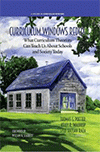
Curriculum Windows Redux
What Curriculum Theorists Can Teach Us About Schools and Society Today
Edited by:
Thomas S. Poetter, Miami University
Kelly Waldrop, The Publish House
Syed Hassan Raza, Miami University
A volume in the series: Curriculum Windows. Editor(s): Thomas S. Poetter, Miami University.
Published 2022
Curriculum Windows Redux: What Curriculum Theorists Can Teach Us about Schools and Society Today is an effort by students of curriculum studies, along with their professor, to interpret and understand curriculum texts and theorists in contemporary terms.
The authors explore how key books/authors from the curriculum field illuminate new possibilities forward for us as scholar educators today: How might the theories, practices, and ideas wrapped up in these curriculum texts still resonate with us, allow us to see backward in time and forward in time – all at the same time? How might these figurative windows of insight, thought, ideas, fantasy, and fancy make us think differently about curriculum, teaching, learning, students, education, leadership, and schools? Further, how might they help us see more clearly, even perhaps put us on a path to correct the mistakes and missteps of intervening decades and of today?
The authors complete the Curriculum Windows series with this 7th book, Redux, providing a scholarly view of 33 books that should have been treated in the first 6 books based on the decades of the 1950s-2000s. The book's Foreword is by renowned curriculum theorist William H. Schubert.
CONTENTS
Foreword, William H. Schubert. Preface, Syed Hassan Raza. Introduction: Curriculum Windows Redux. Is the Zombie Apocalypse Upon Us? Shanna Bumiller. Applying Tyler Today, Brittany A. Buhrlage. “There Is No Better Way to Study Curriculum Than to Study Ourselves”, Misty Cook. The Struggle to the Summit, Jonathan Cooper. Challenging Worldviews: Facing Down Educational Injustices, Tracy Davis. Making Personalized Learning Stick: Using The Child-Centered Schools to Criticize and Bolster Personalized Learning, Lauren Gentene. Scholarship Reconsidered: The Art of Teaching, Craig Myers. The Road Less Traveled: The Best Practice of Teacher Choice, Erin Owens. Turning Towards the Light, Jaime N. Ranly. The Cultural Struggle Is Real in Our Classrooms: How Our Students’ Culture Effects Educating Them, Marilee R. Tanner. Teaching Humans Today, Andrea D. Townsend. Stained or Stained Glass? Multicultural Education for a Pluralistic and Democratic Unum, Nathan Warner. A Red, Haribo Gummy Bear, Ashley Warren. Sticks and Stones, Kelly R. Wilham. A Guide to Creating a Democratic Educational Community: How We Have Been Doing It All Wrong, Rebecca Wilson. Can You Feel It? It’s Time for a Change, Melissa Wipperman. Caged in: Systematic Oppression and the School-to-Prison Pipeline, Elaysha N. Wright. How High Is the Water? Debra Amling. A Window of Potential, Michelle Banks. Multicultural Education: Theory and Practice, Jason A. Fine. Escaping Poverty as a Motivator for Academic Success, Jeremy L. Froehlich. Still Chasing Ghosts, Louis Hacquard III. Equitable Educational Inputs = Social Justice for All, Kimberly K. Halley. The Grass Isn’t Always Greener on the Other Side: The Fraud and Corruption of Charter Schools and the Corrosion on the American Dream, Mindy Layne Jennings. Looking Through a Keyhole: Attempting to Shift the Paradigm, Kristine T. Michael. To Change or Not to Change: A Cautionary Tale for the Educational Chameleon, Tanya Britton Moore. Bajo la Lupa, Under the Magnifying Glass, Erica Lynn Mitchell O’Keeffe. Cognitive Dissonance of Leadership, Jennifer M. Penczarski. Rising Tensions: A Shift in Union Leadership, Kasey A. Perkins. Who Do You Trust? Rhonda R. Phillips. Finding Mark Glass: The Responsibility of White Educators, Thomie Timmons. Curriculum Aims: Is the Window Open or Closed? Tammy Yockey. She Wasn’t Ready: Currere as a Practice for Critical Healing, Tiffany J. Williams.
-
Paperback978-1-64802-969-1
Web price: $62.04 (Reg. 72.99)
-
Hardcover978-1-64802-970-7
Web price: $89.24 (Reg. 104.99)
- eBook978-1-64802-971-4

- EDU007000 - EDUCATION: Curricula
- EDU029000 - EDUCATION: TEACHING METHODS & MATERIALS: General
- EDU032000 - EDUCATION: Leadership
-
 Curriculum Windows
What Curriculum Theorists of the 1950s Can Teach Us About Schools and Society Today
Curriculum Windows
What Curriculum Theorists of the 1950s Can Teach Us About Schools and Society Today
-
 Curriculum Windows
What Curriculum Theorists of the 2000s Can Teach Us About Schools and Society Today
Curriculum Windows
What Curriculum Theorists of the 2000s Can Teach Us About Schools and Society Today
-
 Curriculum Windows
What Curriculum Theorists of the 1960s Can Teach Us about Schools and Society Today
Curriculum Windows
What Curriculum Theorists of the 1960s Can Teach Us about Schools and Society Today
-
 Curriculum Windows
What Curriculum Theorists of the 1970s Can Teach Us about Schools and Society Today
Curriculum Windows
What Curriculum Theorists of the 1970s Can Teach Us about Schools and Society Today
-
 Curriculum Windows
What Curriculum Theorists of the 1980s Can Teach Us About Schools And Society Today
Curriculum Windows
What Curriculum Theorists of the 1980s Can Teach Us About Schools And Society Today
-
 Curriculum Windows
What Curriculum Theorists of the 1990s Can Teach Us About Schools And Society Today
Curriculum Windows
What Curriculum Theorists of the 1990s Can Teach Us About Schools And Society Today
-
 The Handbook for Aspiring Higher Education Leaders
The Handbook for Aspiring Higher Education Leaders

